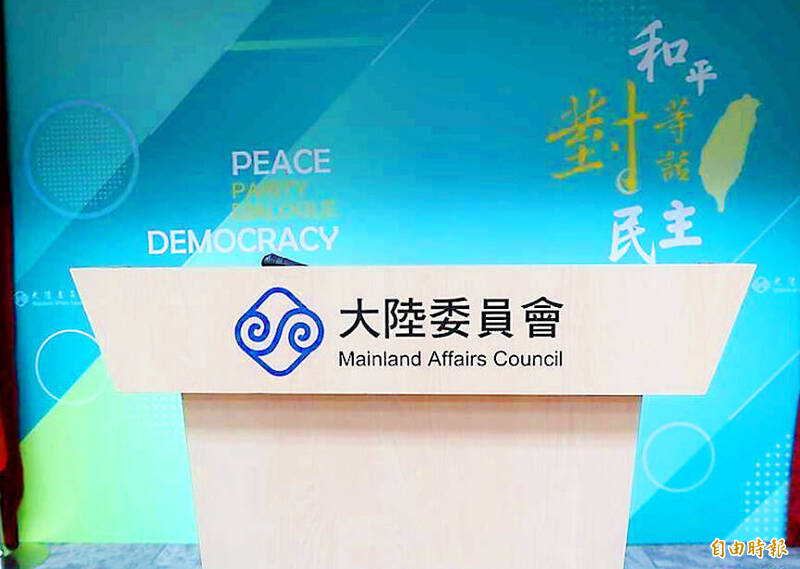《TAIPEI TIMES》 MAC slams partial lifting of China ban

A podium at the Mainland Affairs Council in Taipei is pictured in an undated photograph. Photo: Chung Li-hua, Taipei Times
NO RECIPROCITY: Taipei has called for cross-strait group travel to resume fully, but Beijing is only allowing people from its Fujian Province to travel to Matsu, the MAC said
By Shelley Shan / Staff reporter
The Mainland Affairs Council (MAC) yesterday criticized an announcement by the Chinese Ministry of Culture and Tourism that it would lift a travel ban to Taiwan only for residents of China’s Fujian Province, saying that the policy does not meet the principles of reciprocity and openness.
Chinese Deputy Minister of Culture and Tourism Rao Quan (饒權) yesterday morning told a delegation of Chinese Nationalist Party (KMT) lawmakers in a meeting in Beijing that the ministry would first allow Fujian residents to visit Lienchiang County (Matsu), adding that they would be able to travel to Taiwan proper directly once express ferry services between Fujian’s Pingtan County and Taiwan proper resume.
“We already announced regulations on resuming cross-strait tours on Aug. 24 last year. The Tourism Administration has prepared for the arrival of Chinese tourists based on the regulations, which can be implemented as soon as Beijing lifts the travel ban to Taiwan,” the council said in a statement.
However, while Taipei has called for cross-strait group travel to resume fully, Beijing responded by only allowing Fujian residents to travel to Taiwan, the council said, adding that they can only visit Matsu and are not allowed to visit Penghu and Kinmen counties.
The council also asked why only Fujian residents are allowed to visit Taiwan, and why the resumption of group tours to Taiwan proper is dependent on the resumption of express ferry services between Pingtan and Taiwan.
The policy is not in line with the principles of reciprocity and openness, nor is it normal for tourism, it added.
“We will work with the Ministry of Transportation and Communications to ascertain several details before making a final decision on this matter. This would ensure that the policy is enforceable and cross-strait tourism exchanges can proceed in a healthy and orderly fashion,” the council said.
Tourism Administration Director-General Chou Yung-hui (周永暉) said that his agency has yet to receive official information on the matter, but it would be positive if Chinese are allowed to travel to Matsu.
“Regarding the resumption of express ferry services, the Mainland Affairs Council is in charge of operations involving the ‘small three links’ between China and Taiwan, but we welcome Chinese tourists,” he said.
China’s Taiwan Affairs Office spokesperson Zhu Fenglian (朱鳳蓮) yesterday afternoon urged Taiwan to resume ferry services between Taipei and Pingtan, China, and Taichung and Pingtan, as well as three other cross-strait express ferry services.
Taiwan should also resume direct flights to Tianjin and 29 other Chinese cities, she said.
The Tourism Administration and council should consider canceling their plan to reintroduce a ban on group tours to China in June, as Beijing has shown goodwill, KMT Legislator Hsu Yu-zhen (許宇甄) said.
“The administration previously banned group tours to China on the grounds that such practice would damage national interest, as stated in Article 53 of the Act for the Development of Tourism (發展觀光條例),” Hsu said. “The article was misused in the first place, and the Tourism Administration should quickly end this farce.”
Reopening cross-strait tourism would help relaunch tours to Hualien and Taitung, which were severely affected by the earthquake on April 3 and the aftershocks that followed, she said.
Tour operators and small businesses would also benefit from an increase in international visitors, she added.
“Taiwan should recognize that China has shown that it is open to more cross-strait exchanges, as seen in the dialogues between Chinese President Xi Jinping (習近平) and former president Ma Ying-jeou (馬英九),” Hsu said. “If we can demonstrate goodwill and greater flexibility, cross-strait exchanges would not only boost the economy, but ease tensions across the Taiwan Strait.”
Democratic Progressive Party (DPP) Legislator Lai Jui-lung (賴瑞隆) said KMT caucus whip Fu Kun-chi led the delegation of lawmakers to Beijing even though residents in his constituency in Hualien are still reeling from the massive earthquake on April 3.
“In return, Fu and the delegation accepted prefab houses that China donated to Hualien, and Beijing only lifted the travel ban between Fujian and Matsu. It is not worth the trip if all they received was small gifts and benefits,” Lai said.
“If China intends to reopen cross-strait travel, it should fully open [travel] in a reciprocal manner rather than using it as a political gambit or allowing Chinese tourists to visit only the constituencies of lawmakers who visited China,” he said.
Beijing intends to create the false image that it has held out an olive branch by opening travel to Matsu, forcing the DPP government to remove restrictions on civilian exchanges, Association of Chinese Elite Leadership secretary-general Wang Chih-sheng (王智盛) said.
“Prior to the [COVID-19] pandemic, 200,000 to 300,000 Chinese tourists visited Kinmen per year, far exceeding those visiting Matsu. The message is: ‘I let you win some, you should let me have more,’” Wang said. “This is not a sincere aspiration for cross-strait exchanges, but manipulation with a political purpose.”
新聞來源:TAIPEI TIMES

















